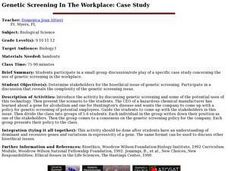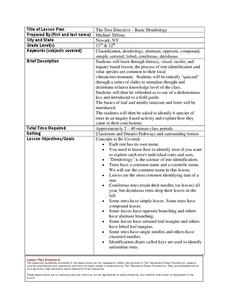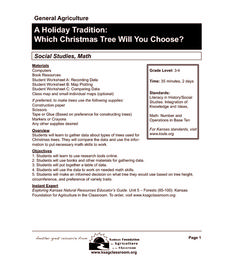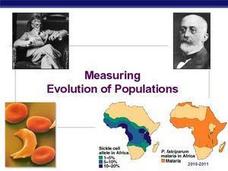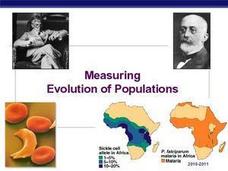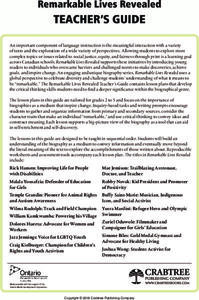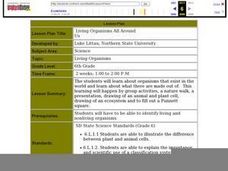Curated OER
Genetic Variation
Students study families and their genetics. In this investigative lesson students explain how variations in genetics can be harmful and how some can help with survival.
Curated OER
Mapping Shakespeare
Twelfth graders read a Shakespearean play focusing on a character. They create "Mind Maps" of their characters and act out a selection of the play.
Curated OER
Genetic Screening In The Workplace: Case Study
Students participate in a small group discussion/role play of a specific case study concerning the use of genetic screening in the workplace.
Curated OER
Writing with Writers
Students identify unique characteristics of different writing genres such as biography, folktales and mysteries. They create original piece of writing using the writing process and then post their original writing online. They think...
Curated OER
The Tree Detective - Basic Dendrology
Students identify tree species by their leaf characteristics. In this dendrology lesson, students learn leaf vocabulary and collect leaves. They identify the leaves using the leaf characteristics and the vocabulary that they learned.
Curated OER
Character Attributes in Writing
Third graders analyze the importance of characters in fiction writing and performances. In this theatre instructional activity, 3rd graders identify the important characteristics of a fictional character and how to portray a character...
California Academy of Science
Human Evolution
As the great and hilarious Tim Minchin once said, "Science is simply the word we use to describe a method of organizing our curiosity." Science is more than just a guess; it is based on questions, observations, and evidence. High...
Personal Genetics Education Project
Genetics and Reproduction
Disease prevention or designer babies? Use a set of slides to introduce the growing practice of preimplantation genetic diagnosis, or PGD. Teens read related articles and then break into groups to address different scenarios. Afterward,...
University of Minnesota
Mirroring Emotions
Do you ever give your class the "teacher look"? Without saying a word, they become silent and engaged (hopefully). How do they know what you're thinking? Explore the concept of nonverbal communication and how it relates to our mirror...
IBM
What Path Will You Follow?
"What do you want to be when you grow up?" is a question every kid has to answer quite often. Here is a lesson that will allow them to do some thinking about that very topic, and to learn about some professions they might consider...
Agriculture in the Classroom
A Holiday Tradition: Which Christmas Tree Will You Choose?
Different varieties of Christmas trees provide an interesting way to combine social studies, science, math, and technology. Class members not only research the history of the Christmas tree holiday tradition, they compare and contrast...
Curated OER
Genes within Populations
Finally, here is a genetics instructional activity that does not include Punnett squares! Designed for a more advanced class, biology learners will compare Lamarck's concept of evolution with Darwin's. They will explore the...
Generation Rx
Medication Safety Patrol: Is It Candy or Medicine? Game
Scholars play a sorting game designed to encourage safe medication handling. They browse pictures of candy and medication, then decide which of the two they're looking at by raising a card labeled candy or medicine.
Curated OER
Measuring Evolution of Populations
The Hardy-Weinberg principle is the focus of this concise slideshow. Some vocabulary definitions are given on the first 2 slides, and the rest are given over to examples of the Hardy-Weinberg theorem. Calculations of the H-W principle...
Curated OER
Measuring Evolution of Populations
The five agents of evolutionary change are reviewed in this slideshow. Definitions of common terms involved with populations and equilibrium are given, and there are some presentations of Hardy Weinberg equations for common examples of...
Personal Genetics Education Project
How Does Ancestry Testing Work? Exploring Admixture Testing
Find out the science behind ancestry testing! Investigators watch a video exploring how ancestry works before participating in a hands-on group activity. Scholars role play scientists while learning about testing protocols and test...
Personal Genetics Education Project
Reproductive Genetic Testing: Technology, Access, and Decision Making
Explore the complexities of reproductive genetic testing respectfully in the learning space. Scientists read articles, view a slideshow, and complete a do-now about genetic technologies. A fishbowl activity allows scholars to discuss the...
PACER Center
The Peer Advocacy Guide
Teasing, mocking, and disrespect can be the hallmarks in the life of those with disabilities. Disrupt the cycle of abuse with a toolkit designed to turn peers into advocates for all those who are bullied. Everything needed to create a...
Curated OER
Humor and Psychology
Get a chuckle from this presentation, which studies the types of humor in psychology and philosophy. The information provided would fuel a good conversation in your lecture, and the multitude of examples will get your class laughing. The...
Curated OER
Patriotic Symbols of the United States
Young historians take a close look at the most famous patriotic symbols of the United States and determine what they actually stand for. Symbols such as Uncle Sam, The Statue of Liberty, The Bald Eagle, and The Liberty Bell are studied....
Curated OER
Flying Freudian Fun: A Look At Ethical Decision Making
There are not many more apt examples of ethics gone awry than William Golding's Lord of the Flies.. Ninth graders focus the ethics of decision making with the examples provided in the plot. They focus on the concept of the psyche and how...
Serendip
Soap Opera Genetics – Genetics to Resolve Family Arguments
Did she cheat on her husband? Did the hospital switch the babies? Should they have children? As much as this sounds like the plot for a soap opera, all of these questions fit into a single lesson on genetics. Scholars read about three...
Crabtree Publishing
Remarkable Lives Revealed
Six lessons make up a unit all about biographies. Scholars read about a remarkable life while taking notes and identifying characteristics of the biographical genre. Readers examine the tale's obstacles, accomplishments, and sequence of...
Curated OER
Living Organisms All Around Us
Sixth graders study organisms that exist in the world and what they are made up of. They participate in a nature walk, a presentation, a drawing of an animal and plant cell, draw a ecosystem, and fill out a Punnett square.




